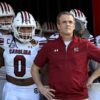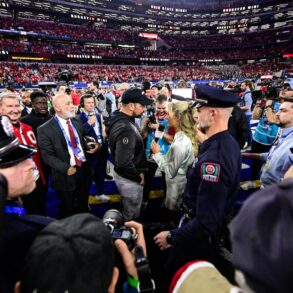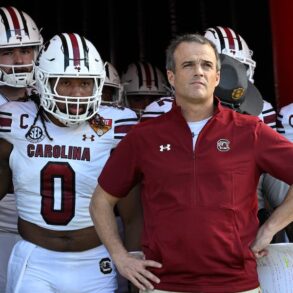West Virginia head coach Rich Rodriguez has already had success in Morgantown.
Leading the football program from 2001-07, Rodriguez led the Mountaineers to a 60-26 record and three consecutive seasons with at least ten wins. But college football has changed in a lot of ways including the rise of name, image and likeness as a key component of roster management.
But like any good coach Rodriguez has adapted with the times. On top of just being a more seasoned head coach, he’s also had to embrace the new challenges that have come with the new era of college football.
“You have to evolve and if you want to win and have success at this level or any level, if the goal posts are moving then you better move with it and that’s what I’ve tried to learn and keep doing,” he said.
A self-described “football junkie,” Rodriguez is always pushing himself to learn more whether that’s scheme, methods or in recruiting. So, while it’s a different landscape than the one that Rodriguez inherited during his first tenure it’s one that he is prepared to meet head on in his second.
“There’s a lot more knowledge and things that I know now that I didn’t know in 2001 but there’s also more challenges to being a head coach,” he said.
When it comes to a plan to address transfers and attracting as well as retaining talent on the roster, Rodriguez developed a plan at Jacksonville State where they molded the construction on an NFL scale.
By that, Rodriguez said that they apply certain percentages of funding to various positions on the roster such as a quarterback one receiving x amount of money and left tackles and down the line. Now that has to be spread out more than in the NFL simply because of the number of players that must be paid but it’s a formula that has worked as Rodriguez welcomed 60 new players with the Gamecocks last season and won the Conference USA Championship.
That will be aided even more once the revenue sharing model is approved and goes into effect July 1 with the schools taking ownership of that as opposed to a variety of NIL deals.
“We are going to have an earned success model where if you’re the starting left tackle after August camp you’re going to get more money than the scout team right tackle. To have a fair system we’re going to do with our players,” Rodriguez said. “We have that model in place, we have that system ready to go. Some of that has already been implemented a lot of that will be implemented we hope June 30 when the rev share goes into play and the school can now pay players.”
There will still likely be an NIL component to it all even outside the revenue sharing model but Rodriguez expects that will be better regulated compared to the current system. That also could open opportunities at a school like West Virginia which is the only power four program in a state with no professional teams.
“Our guys are a bigger deal in our state than a lot of similar type of programs in other states’” Rodriguez said. “Hopefully we can still have some NIL stuff where there’s interest at and we can get some really good players with that.”
The rise of the transfer portal has changed so much already in college football with some schools openly opting out of holding spring games to avoid having their players poached by other programs. It is a genuine concern compared to the past when the focus was more on coaches worrying about showing too much of their various schemes.
“We’ll have some little bit of scrimmage and play a little bit of football but I am worried about it because there’s not as much structure to keep the tampering away as it should be,” Rodriguez said.
West Virginia even scheduled their spring practice schedule to align with the beginning of the spring transfer portal window April 16 to allow a week for Rodriguez and the rest of the coaching staff to individually meet with players. That’s especially important with the potential for the total roster size to be reduced to 105 if the House Settlement is indeed passed.
“I’m still hoping we can grandfather that in and eventually get to that number because there’s going to be some really good players and some really hard working men that we have to cut just to fit the roster size and that’s not going to be fun at all,” he said.
This post was originally published on this site be sure to check out more of their content.






